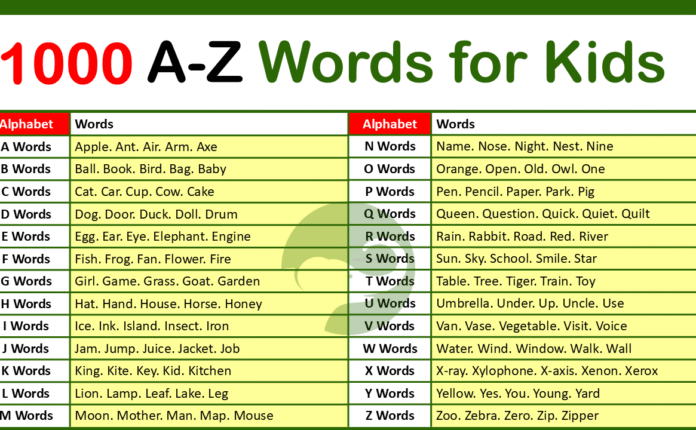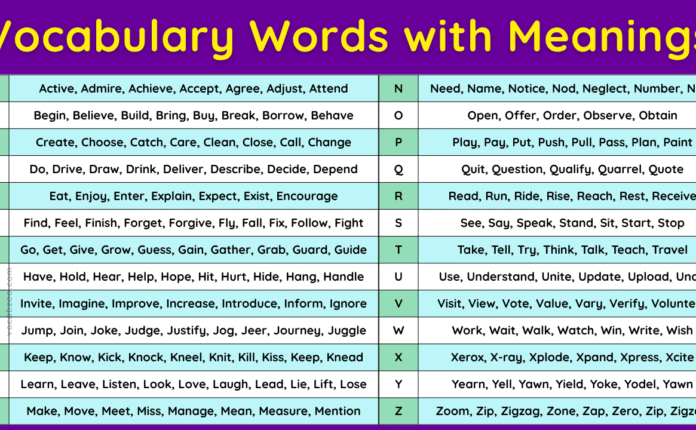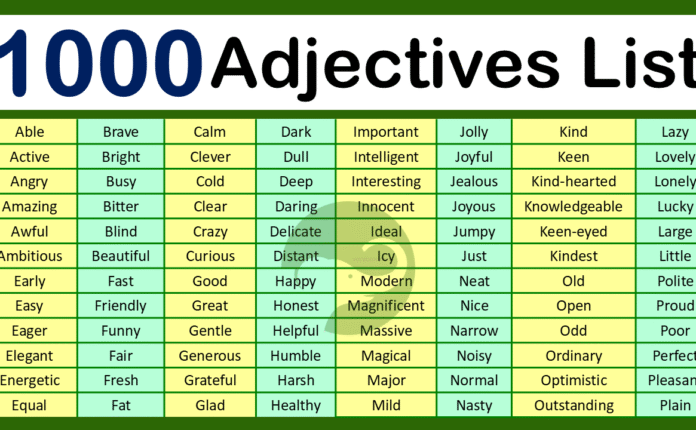Learning a List of Pronouns in English helps you replace nouns and make your sentences smoother and clearer. In this blog post, you will find pronouns from A to Z with examples to understand and remember easily. Knowing these pronouns improves your speaking, reading, writing, and listening skills, making your English more natural and fluent. By the end, you will be able to use this List of Pronouns confidently in sentences and conversations.
What is a Pronoun?
A pronoun is a word that we use instead of a noun. It helps us avoid repeating the same noun again and again.
Example:
Emma is my friend. She loves reading books.
(Here, she replaces Emma.)
In short: Pronouns stand in place of nouns to make sentences more natural and fluent.
Types of Pronouns with Examples
| Type | Explanation | Example |
|---|---|---|
| Personal Pronouns | Used for people or things | I, you, he, she, it, we, they |
| Possessive Pronouns | Show ownership | mine, yours, his, hers, ours, theirs |
| Reflexive Pronouns | Reflect back to the subject | myself, yourself, himself, herself, itself, ourselves |
| Demonstrative Pronouns | Point to specific things | this, that, these, those |
| Interrogative Pronouns | Used to ask questions | who, what, which, whose |
| Relative Pronouns | Connect clauses | who, whom, which, that |
| Indefinite Pronouns | Refer to non-specific people or things | anyone, someone, everyone, nobody, something |
A to Z List of Pronouns in English
Here’s A to Z list of pronouns in English:
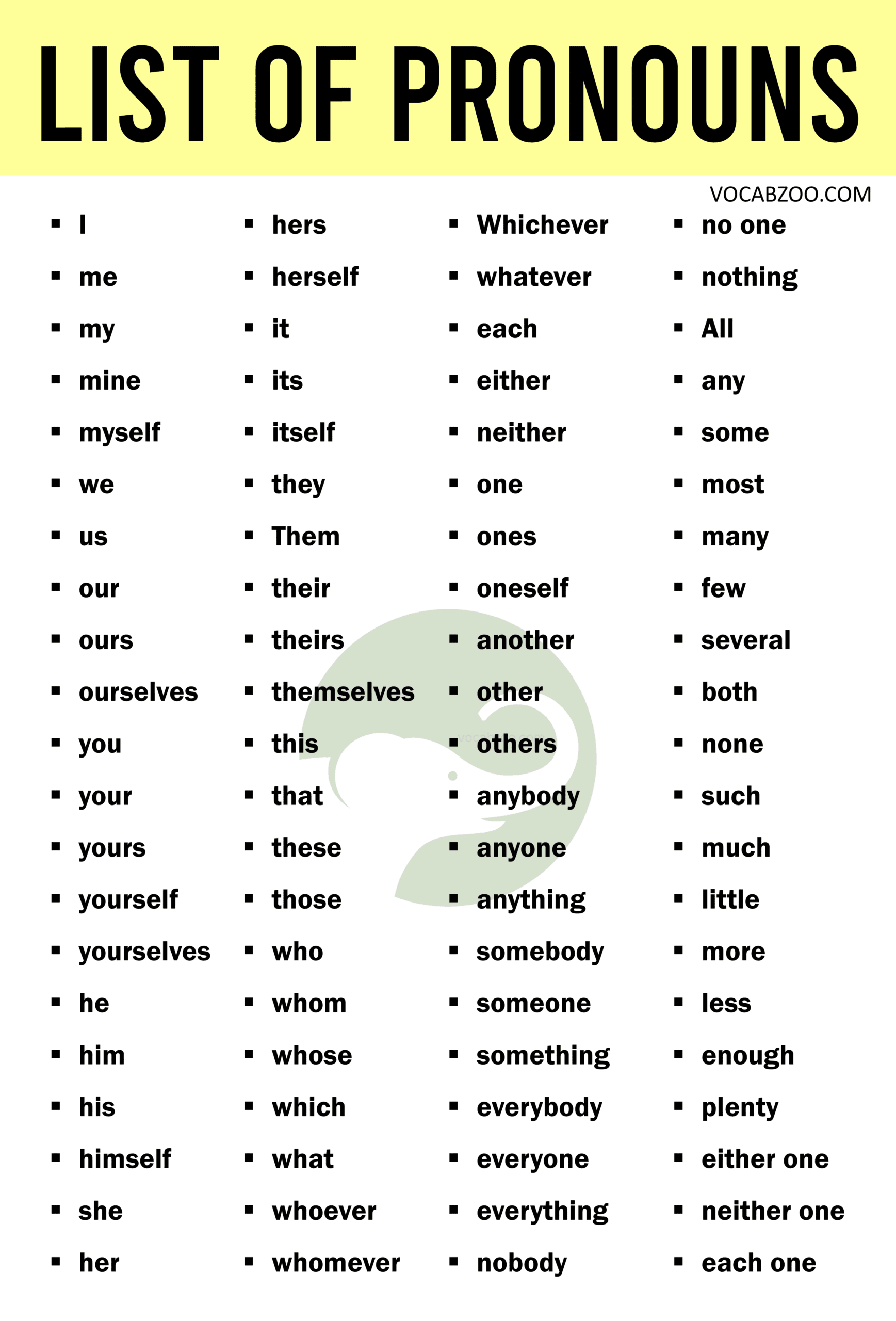
Pronouns that Start with A
- all
- another
- anybody
- anyone
- anything
- aught
- all of us
- all of them
- all of you
- all of it
- any
- any of us
- any of them
- any of you
- any of it
Pronouns that Start with B
- both
- both of us
- both of them
- both of you
- both of these
- both of those
Pronouns that Start with C
- certain
- each
- either
- each one
- each other
- each of us
- each of you
- each of them
Pronouns that Start with D
- did
- do
- does
- dear me (old form)
- dis (informal)
- dat (informal)
Pronouns that Start with E
- each
- either
- everybody
- everyone
- everything
- every
- each one
- each person
- each thing
Pronouns that Start with F
- few
- fewer
- few of us
- few of them
- few of you
- few of these
- few of those
Pronouns that Start with G
- he
- her
- hers
- herself
- him
- himself
- his
- his own
- her own
Pronouns that Start with H
- how
- how many
- how much
- how far
- whoever
- whomever
Pronouns that Start with I
- I
- it
- its
- itself
- I myself
- I alone
- I who
- I that
Pronouns that Start with J
- just anybody
- just everyone
- just everything
- just anyone
Pronouns that Start with K
- kind of (used in some phrases)
- known one (rare)
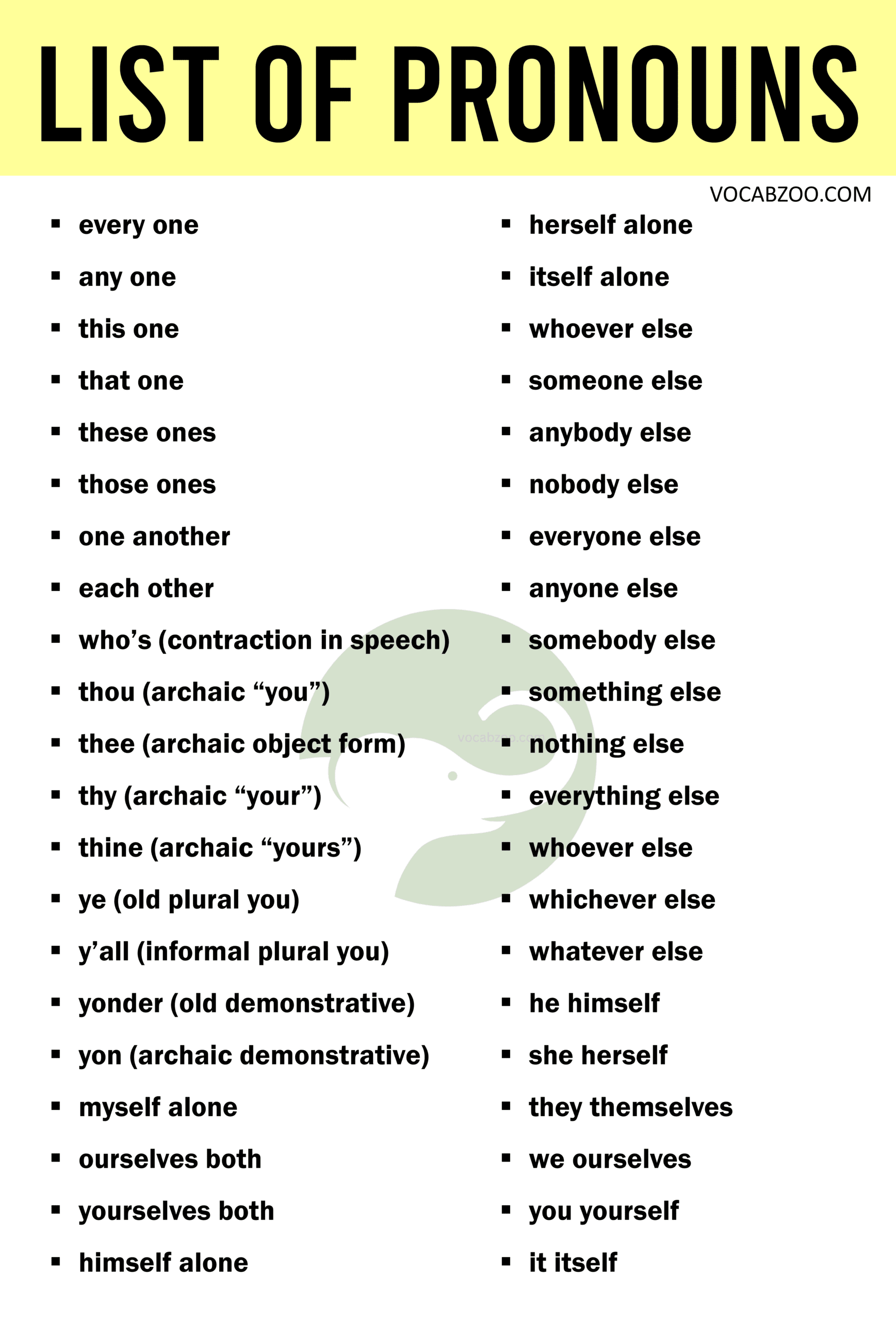
Pronouns that Start with L
- least
- less
- little
- lots
- lot of
- lots of
- little of
- little one
- lesser
Pronouns that Start with M
- many
- me
- mine
- myself
- more
- most
- much
- many of us
- many of them
- many of you
Pronouns that Start with N
- neither
- nobody
- none
- no one
- nothing
- naught
- neither of us
- neither of them
Pronouns that Start with O
- one
- oneself
- other
- others
- our
- ours
- ourselves
- one another
- one of us
- one of them
Pronouns that Start with P
- part
- part of
- plenty
- plenty of
- particular one
Pronouns that Start with Q
- quite a few
- quite a lot
- quite some
Pronouns that Start with R
- rest
- remainder
- relative
Pronouns that Start with S
- same
- she
- somebody
- someone
- something
- some
- such
- self
- several
- selfsame
- some of you
- some of us
- some of them
- some of those
- someone else
- somebody else
Pronouns that Start with T
- that
- their
- theirs
- them
- themselves
- these
- they
- this
- those
- that one
- these ones
- those ones
Pronouns that Start with U
- us
- utmost (rare)
- unself (poetic)
- under one (old poetic)
Pronouns that Start with V
- various
- variety of
- very one (old poetic)
- very self (literary)
Pronouns that Start with W
- we
- what
- whatever
- whatsoever
- which
- whichever
- whoever
- whom
- whomever
- whose
- whomsoever
- whosoever
- who
- where
- when
- why
Pronouns that Start with Y
- you
- your
- yours
- yourself
- yourselves
- ye (old English)
- yon (old word for “that”)
- yonder (poetic)
- y’all (informal)
- you all
- you both
- you each
Pronouns that Start with Z
- zero (used like “none”)
- zilch (slang for “nothing”)
- ze (gender-neutral pronoun)
- zir (gender-neutral possessive)
- zim (gender-neutral object form)
- zie (modern gender-inclusive form)
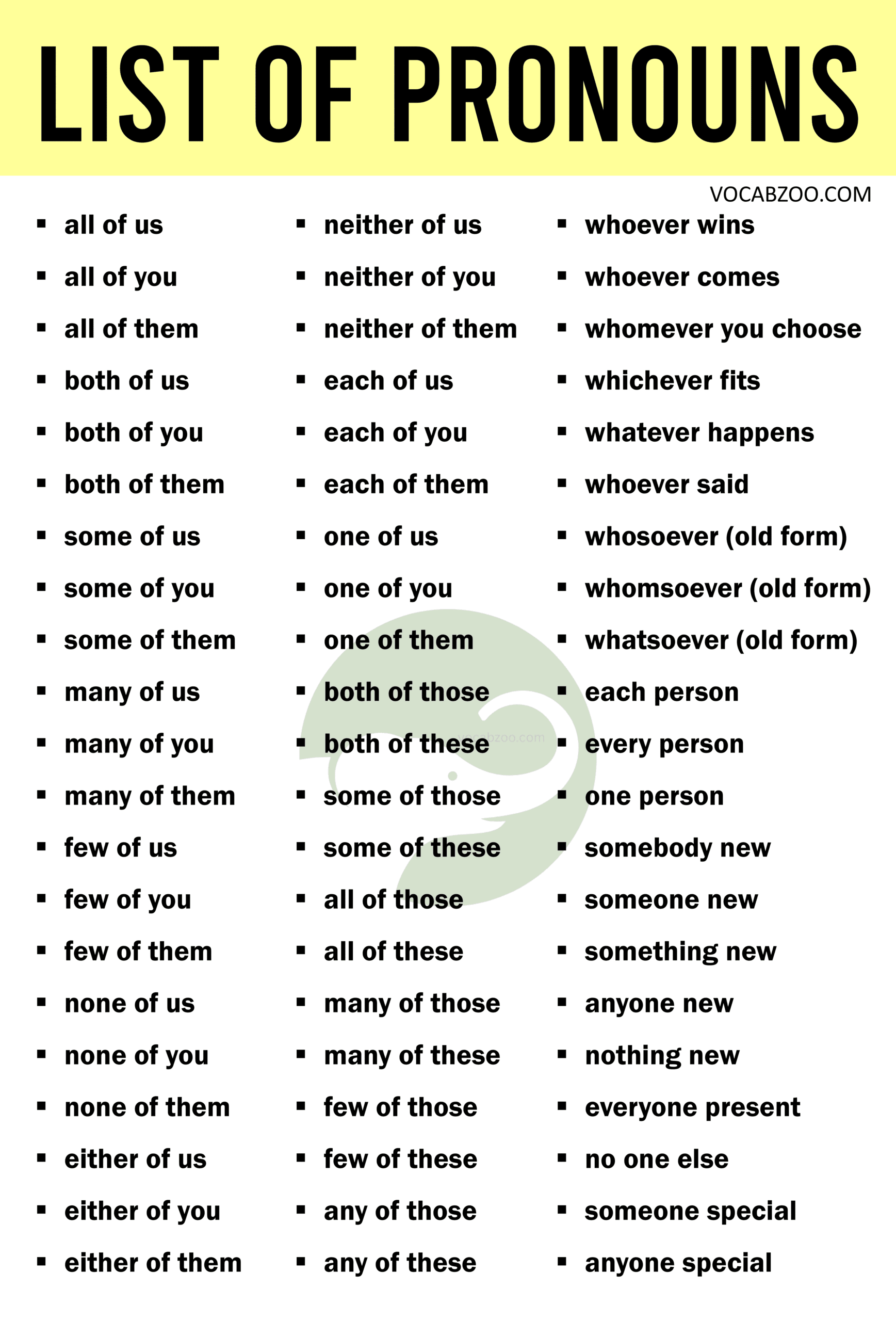
Pronouns Examples by Types
1. Personal Pronouns:
I, you, he, she, it, we, they, me, him, her, us, them
2. Possessive Pronouns:
mine, yours, his, hers, ours, theirs, its
3. Reflexive Pronouns:
myself, yourself, himself, herself, itself, ourselves, yourselves, themselves
4. Demonstrative Pronouns:
this, that, these, those
5. Interrogative Pronouns:
who, whom, whose, what, which
6. Relative Pronouns:
who, whom, whose, which, that
7. Indefinite Pronouns:
all, any, another, anybody, anyone, anything, each, either, everybody, everyone, everything, few, many, neither, nobody, none, no one, nothing, one, other, several, some, somebody, someone, something, such
8. Reciprocal Pronouns:
each other, one another
9. Intensive Pronouns:
myself, yourself, himself, herself, itself, ourselves, yourselves, themselves
10. Gender-Neutral / Modern Pronouns (Inclusive Forms):
ze, zir, zie, xe, xem, xyr, they (singular), themself
Pronouns are the building blocks of fluent English. Learning and practising them will help you write and speak more naturally. Use the A to Z list and examples in this article to remember and apply pronouns correctly in your daily life.
Why Pronouns Are Important
Pronouns make your sentences clear, short, and smooth. They help you sound more natural while speaking or writing.
Example:
- John likes football. John plays it every day.
- John likes football. He plays it every day.
FAQs about Pronoun Words
What is a pronoun in simple words?
A pronoun is a word used instead of a noun to avoid repetition.
How many types of pronouns are there in English?
There are seven main types of pronouns such as personal, possessive, reflexive, demonstrative, interrogative, relative, and indefinite.
What are 10 examples of pronouns?
I, he, she, it, we, you, they, mine, yours, this.
What is the easiest way to learn pronouns?
Read short sentences and try replacing nouns with pronouns.
Can a pronoun replace more than one noun?
Yes, they or them can replace plural nouns like Alex and Sarah → They are friends.
Read More

